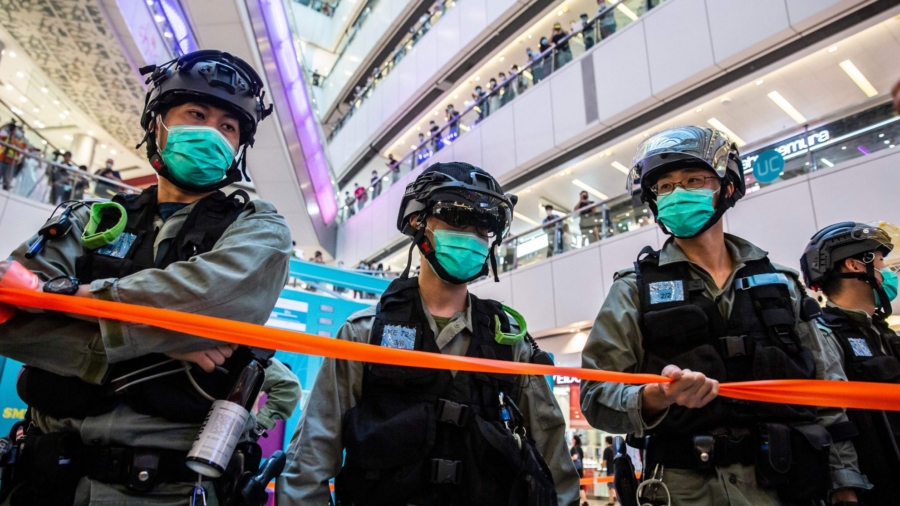The United States’ actions in response to Beijing’s expanding control over Hong Kong will “inflict pain” on Chinese Communist Party (CCP) officials, while dampening the city’s attractiveness as a financial hub, analysts said.
President Donald Trump on July 14 signed into law a bill that stipulates sanctions on officials and banks involved in eroding the city’s autonomy. He also signed an executive order ending Hong Kong’s preferential treatment by the United States.
Trump said the Hong Kong Autonomy Act, passed unanimously by Congress, provided “powerful new tools to hold responsible the individuals and the entities involved in extinguishing Hong Kong’s freedom.”
The executive order, meanwhile, revokes or suspends privileges that Hong Kong has enjoyed in areas including immigration, trade, and investment.
“Hong Kong will now be treated the same as mainland China,” Trump said. “No special privileges, no special economic treatment, and no export of sensitive technologies.”
The actions were in response to Beijing’s imposition of a national security law over Hong Kong, which criminalizes acts deemed as secession, subversion, and “collusion with foreign forces.” Many residents are worried that the law has ushered in an era of authoritarian rule over the territory.
Punishing CCP Officials
John R. Mills, former director of cybersecurity policy, strategy, and international affairs at the Office of the Secretary of Defense, said the executive order contains a “very powerful” provision allowing the administration to freeze the U.S.-based assets of Chinese and Hong Kong officials responsible for abuses in the city.
This applies to officials and leaders involved in drafting and developing the national security law, undermining democratic processes in Hong Kong, censoring or limiting freedom of expression or the press, and human rights abuses in the city. Secondary sanctions could also be imposed on people or entities that have provided financial, material, or technological support to sanctioned officials.
This measure, coupled with the sanctions under the Hong Kong Autonomy Act, sends a strong message to the CCP, according to Mills.
“We are inflicting cost for bad behavior,” he said in an interview.
Mills added: “One of the untold stories of what’s going on is the amount of senior people in the CCP and China that have property holdings in the United States.”
He said that the high volumes of foreign assets held by officials amounted to “a vote of no confidence” in the communist regime.
Thus any move to freeze U.S. properties would hurt many high-level CCP members.
“There’s a lot of officials that are not very happy about it, and it’s gonna cause clamor, discord, and likely conflict inside the CCP,” Mills said.
‘No Different From Mainland’
Gordon Chang, a U.S.-based analyst on China, said the combined effect of the new security law and the U.S. decision to withdraw Hong Kong’s special trade privileges have “drastically” reduced the city’s attractiveness for businesses.
“Instead of going to Hong Kong, [investors will] just go directly to Shenzhen, Shanghai or wherever,” he told NTD, an affiliate of The Epoch Times. “And you got to remember that Hong Kong really prospered when China closed itself off because people had to go to Hong Kong.”
A number of business tycoons and former Hong Kong officials have moved their riches abroad following the national security law’s implementation, said Hong Kong hedge fund manager Edward Chin.
The law “can claim your life’s worth any time,” Chin told The Epoch Times, describing the law’s terms as “land mines.” “It’s no different from mainland China.”
“Ask ten Hongkongers about the national security law, 11 people would oppose it,” he added.
In an American Chamber of Commerce business survey released July 13, three-quarters of the 183 respondents expressed concerns about the law, with many pointing to its ambiguities.
“I find it very hard, as a non-mainlander and non-communist, to feel secure and confident … with a law worded and structured such that the law means whatever we say it means,” one respondent said in the survey. One-third of those surveyed were mulling relocating their offices.
The law has also prompted the New York Times to shift a-third of its Hong Kong staff to Seoul.
As the city gets “buffeted” by the stringent Chinese law and international sanctions, the international financial hub will lose its former glory, Chang said. “It’ll remain a financial center, but only a financial center for China.”
Kitty Wang of NTD, an affiliate of The Epoch Times, contributed to this report.
From The Epoch Times


